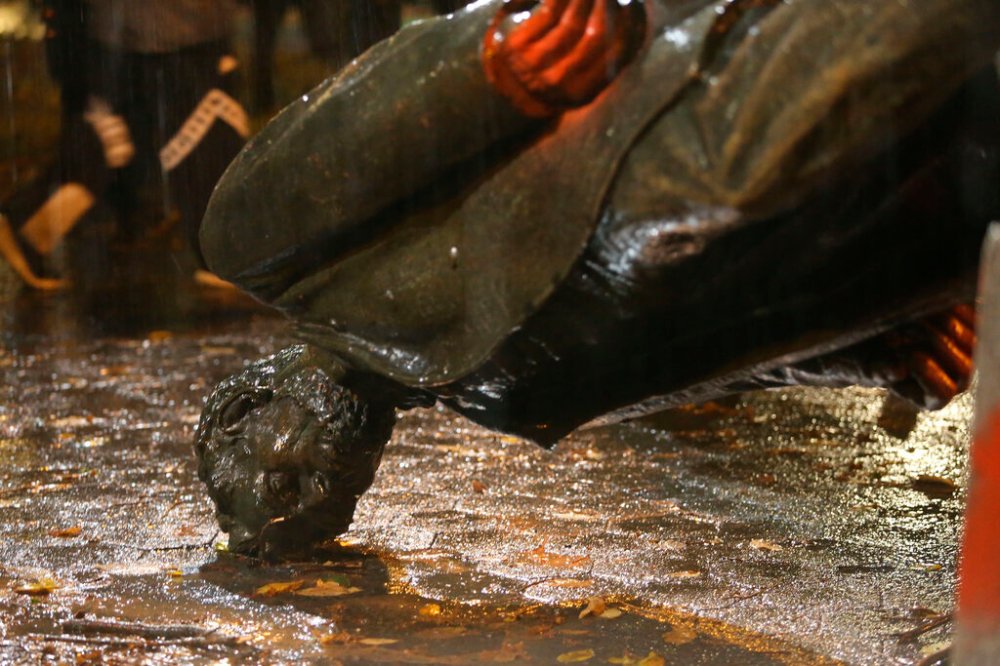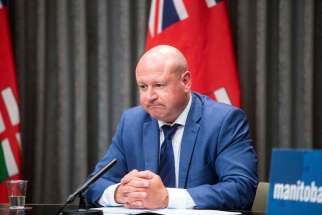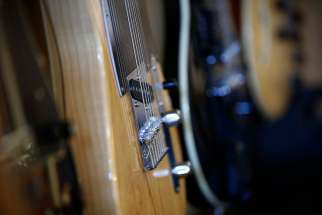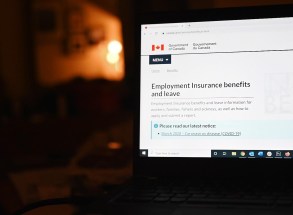Distant cities, similar frustrations Indigenous communities in Winnipeg and Portland share miserable histories and have grown weary of leaders' inaction on meaningful systemic change
Read this article for free:
or
Already have an account? Log in here »
To continue reading, please subscribe:
Monthly Digital Subscription
$0 for the first 4 weeks*
- Enjoy unlimited reading on winnipegfreepress.com
- Read the E-Edition, our digital replica newspaper
- Access News Break, our award-winning app
- Play interactive puzzles
*No charge for 4 weeks then price increases to the regular rate of $19.00 plus GST every four weeks. Offer available to new and qualified returning subscribers only. Cancel any time.
Monthly Digital Subscription
$4.75/week*
- Enjoy unlimited reading on winnipegfreepress.com
- Read the E-Edition, our digital replica newspaper
- Access News Break, our award-winning app
- Play interactive puzzles
*Billed as $19 plus GST every four weeks. Cancel any time.
To continue reading, please subscribe:
Add Free Press access to your Brandon Sun subscription for only an additional
$1 for the first 4 weeks*
*Your next subscription payment will increase by $1.00 and you will be charged $16.99 plus GST for four weeks. After four weeks, your payment will increase to $23.99 plus GST every four weeks.
Read unlimited articles for free today:
or
Already have an account? Log in here »
Hey there, time traveller!
This article was published 13/10/2020 (1886 days ago), so information in it may no longer be current.
In 2015 the City of Portland formally recognized the second Monday in October as Indigenous Peoples’ Day, replacing “Columbus Day” — in honour of Christopher Columbus.
I don’t likely have to explain who Columbus is, but I probably have to explain that Portland is one of the most Indigenous cities in North America. The Oregon city boasts the ninth-largest Native American population in the U.S., with 60,000 tribal citizens from 380 different nations.
Oregon has also been the site of some of the most brutal invasions, massacres and theft of Indigenous lands in American history. Here, miners and militia openly attacked Indigenous communities, raped women and girls and squatted on lands for two centuries.
Media was openly complicit, too. As one Oregon newspaper would write in 1855: “The Indians are ignorant, abject and debased by nature, whose minds are as incapable of instruction as their bodies are of labour…. They have nothing in common with Humanity but the form.”
A quarter of the children in Portland’s child-welfare system are Indigenous, compared to five per cent of the city’s population.
Scrambling from the invasion, many Native Americans relocated to Portland, where thousands of descendants live today. Through the genocide they persevered, building one of the most vibrant and dynamic working-class communities in the United States.
Like their African American counterparts, many Native Americans in Portland run businesses, sit in public office and hold high positions throughout the private and public sectors.
At the same time, 50 per cent of Native American people live at or below poverty level, most are under the age of 30 and only a third of them have a high school diploma. A quarter of the children in Portland’s child-welfare system are Indigenous, compared to five per cent of the city’s population.
Sound familiar?
The Portland Indigenous community is almost identical to Winnipeg’s in size and demographics. The stories of violence, relocations and genocide mirror one another. Portland is slightly smaller than Winnipeg population-wise, but our city has a larger proportional Indigenous community, so the cultural makeup is virtually the same.

So, we should all take note what happened last weekend on the eve of Indigenous Peoples’ Day in our sister community.
On Sunday, a group of activists declared an “Indigenous Peoples Day of Rage,” co-ordinating a series of peaceful events across the United States. Most events were feasts, marches and banner-raisings in several cities including Minneapolis and New York and on tribal nations. Events took place in Nova Scotia and British Columbia, too.
According to the Day of Rage website, activists said: “We have grown frustrated with the uninspired assimilationist politics of Indigenous Peoples’ Day…. We do not believe that we can vote our way out of this crisis. We will not beg politicians to reform the very system that is predicated on our genocide and destruction of our Earth Mother. We urge for something more effective towards the undoing of colonialism in our lands.”
In Portland, approximately 300 activists responded by removing statues of former presidents Theodore Roosevelt and Abraham Lincoln. They then broke into the entranceway of the nearby Oregon Historical Society and took various items. Over the next few hours windows were smashed, property was damaged and shots were fired in what police called “one of the most damaging nights of demonstrations in five months of nightly unrest.”
“Violence doesn’t work for us… we cannot tear down a system using fire or rocks or destruction and then build it back up from nothing. We have to… change process, change the system and build it back up from the best things possible.”
– Tawna Sanchez
By the time Indigenous Peoples’ Day arrived, a riot had been declared and three people were arrested. Unsurprisingly, in a series of tweets, President Donald Trump blamed the “radical left,” “Antifa” and “poorly run Democratic cities.”
Native American reaction was mixed. Many offered support, especially online. Some condemned it.
Most decried the violence. Tawna Sanchez, a Shoshone, Bannock and Ute politician who represents district 43 in north-central Portland in the state house of representatives, said: “Violence doesn’t work for us… we cannot tear down a system using fire or rocks or destruction and then build it back up from nothing. We have to… change process, change the system and build it back up from the best things possible.”
At the same time, activists had been peacefully been asking something be done about the Lincoln and Roosevelt statues for years. If you want to know why, Lincoln led during the time of Oregon’s genocide and Roosevelt hated Indigenous peoples, saying one time: “I don’t go so far as to think that the only good Indians are dead Indians, but I believe nine out of 10 are, and I shouldn’t like to inquire too closely into the case of the tenth.”
The problem, of course, is that peaceful change — such as declaring Indigenous Peoples’ Day — meant nothing to Portland. It didn’t stop poverty in Indigenous communities, kids failing out of high school or even statues commemorating Native American genocide.
Change doesn’t come from a name, even if called a “Year of Reconciliation.”
It comes from direct, swift and decisive action.
I hope our leaders notice, because Portland and Winnipeg aren’t that far away from one another.
niigaan.sinclair@freepress.mb.ca

Niigaan Sinclair is Anishinaabe and is a columnist at the Winnipeg Free Press.
Our newsroom depends on a growing audience of readers to power our journalism. If you are not a paid reader, please consider becoming a subscriber.
Our newsroom depends on its audience of readers to power our journalism. Thank you for your support.






